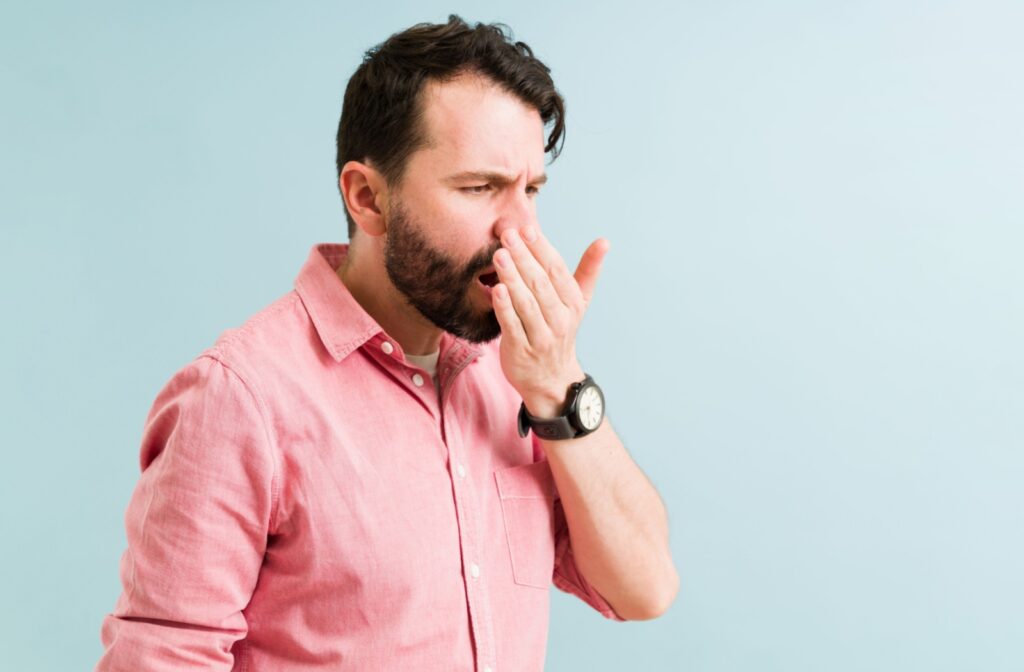When it comes to oral health, cavities and bad breath are two of the most common concerns that bring people to the dentist. But are these two issues related? Here are a few factors how cavities can cause bad breath:
- Bacterial activity
- Decomposing food particles
- Secondary infections
What Are Cavities?
Cavities, also known as dental caries or tooth decay, occur when the hard surface of your teeth is permanently damaged. This happens due to the buildup of plaque, a sticky film of bacteria. When sugars in the food you eat interact with these bacteria, acids are produced. These acids can erode the tooth enamel, leading to small indentations on the tooth called cavities.
Left Untreated
Leaving a cavity untreated can lead to a range of serious dental and overall health issues. As the decay progresses, it can extend deeper into the tooth, reaching the delicate pulp tissue, which contains nerves and blood vessels. This can result in painful toothaches and sensitivity to hot and cold temperatures.
If the decay reaches the pulp, it can also cause infection that might necessitate a root canal or even lead to the complete loss of the tooth. Additionally, an untreated cavity can cause abscesses, which are painful infections at the root of the tooth or between the gum and tooth.
This can further spread to other parts of the body, leading to serious health complications such as jaw bone damage and increased risk of cardiovascular diseases. Therefore, timely treatment of cavities is crucial to prevent extensive damage and more severe health issues.
How Cavities Can Cause Bad Breath
- Bacterial Activity: The primary link between cavities and bad breath is the bacteria involved in the decaying process. As bacteria break down food particles and tooth structure, they release foul-smelling volatile sulfur compounds. These are the same compounds commonly responsible for halitosis, or bad breath. The continuous activity of these bacteria not only worsens the cavity but also perpetuates a cycle of chronic bad breath that regular mouthwash or breath fresheners may struggle to effectively mask.
- Decomposing Food Particles: Cavities also create crevices in teeth where food particles can get trapped. These particles are difficult to remove with regular brushing and flossing and can decompose, producing an unpleasant odor. The decomposition process generates additional bacterial growth, exacerbating the smell and potentially leading to further decay in surrounding teeth structures.
- Secondary Infections: If cavities are left untreated, they can lead to deeper infections in the tooth pulp or gum, which can exacerbate the problem of bad breath. These infections can produce pus and other odorous discharges, significantly impacting breath quality. Moreover, the presence of infection can spread, possibly causing systemic health issues that extend beyond oral health, including impacting the sinuses, which can compound issues with bad breath.
Managing and Preventing Bad Breath from Cavities
- Maintain Good Oral Hygiene: Regular brushing and flossing are essential. Brushing twice a day with fluoride toothpaste and flossing at least once a day can help remove the food particles and plaque that are the breeding grounds for bacteria. Additionally, using an interdental brush or water flosser can enhance cleaning between teeth and below the gumline, areas often missed by regular brushing and flossing. This comprehensive cleaning routine can significantly reduce the risk of cavities and bad breath.
- Regular Dental Check-Ups: Visiting your dentist regularly for cleanings and check-ups can help catch and treat cavities early before they become more serious problems. These visits also allow the dentist to perform professional cleanings that remove tartar—hardened plaque that cannot be removed by brushing alone. Regular assessments can also help in identifying any other oral health issues that might contribute to bad breath.
- Consider Mouthwash: An antibacterial mouthwash can help reduce the number of bacteria in your mouth, thus helping control the production of unpleasant odors. Besides its ability to kill bacteria, mouthwash can reach areas that are difficult for a toothbrush or floss to clean, providing an additional layer of defense against odor-causing bacteria and other oral health problems.
- Stay Hydrated: Drinking plenty of water helps maintain saliva production, which is nature’s way of keeping your mouth clean. Saliva helps wash away food particles and bacteria, and a well-hydrated body produces an adequate amount of saliva. This not only helps prevent dry mouth, which can lead to bad breath, but also enhances your overall ability to fight oral bacteria effectively.
- Watch Your Diet: Reducing the intake of sugary and acidic foods can help prevent the formation of cavities and, by extension, combat bad breath. Foods high in sugar and acid can erode tooth enamel and feed the bacteria that cause decay and bad breath. Incorporating more fresh fruits, vegetables, and foods rich in fiber can stimulate saliva flow and act as natural teeth cleansers, reducing the risk of cavities and promoting fresher breath.
Conclusion
While cavities are not the only cause of bad breath, they are a significant contributing factor. The decay process allows bacteria to thrive and produce odors that are hard to mask. By taking proactive steps towards maintaining good oral hygiene, making regular visits to your dentist, and being mindful of your diet, you can help prevent both cavities and the accompanying bad breath.
Remember, a healthy mouth is not only about a bright smile but also about fresh breath and overall health. Book an appointment with Shawnessy Dental today to learn more about cavities.


